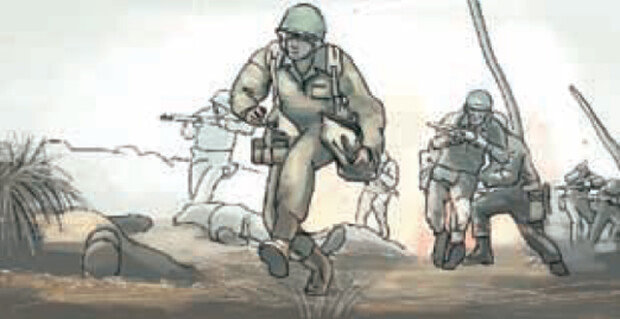Battle of Highlands
Battle of Highlands
Posted July. 10, 2018 07:57,
Updated July. 10, 2018 07:57

On June 25, 1953, three years after the start of the Korean War, a shoot-out broke out between South Korean Third Division and the 67th Camp of the Chinese Communist Army in 529 Highland located in the so-called Iron Triangle. Truce talks began in April, 1953, but in May, the Chinese armies started to mount massive attacks throughout the summer. The sizzling summer of 1953 witnessed a bloody struggle in the Iron Triangle Battlefield. It was a battle that explored the end of the tether of courage, patience, and anger. At the top, Korean mountains offer a sweeping view, but the steep, rocky terrain does not offer visions down the mountain slopes that are necessary for a battle. The rocks may serve as a good cover, but the battle environment is such that both the attackers and the defenders had to charge towards each other through the torrent of shells and bullets. After getting close enough, it was a full-on melee involving guns and grenades.
When the Chinese troops were mounting attacks, each solider would throw dozens of grenades, covering the sky black. When attacking from higher points, they would roll down grenades, which was as much as fatal. Aggression required much courage and entailed massive damage, and by the time either side miraculously took the higher ground, they would already be exhausted. Occupation would instantly translate into a chance for counterattacks. And this was the nightmare that was the Battle of Highlands. Winning or losing, both camps had to engage in a second battle and fight to survive tooth and nail. So many young men perished in the ashes pain and anger.
Memories remain vivid in the Iron Triangle, with the mountain rocks still cracked and broken. The fiercest battle took place in a relatively low mountain area; more bloody fighting memory was embedded in narrower, steeper, and sleek ridges allowing for no escape. Some describe the outbreak of the Korean War as a sacrifice for the Cold War, and others ascribe it to internal discords. Both have points. The Battle of Highlands is often reenacted in the academic circles. In highlands, there is only one place to plant a flag, but society is always more complex. What angers me the most is the fatuous diagnosis of scholars that distorts the value of death and pain of the soldiers and arbitrarily divides good and evil. All lessons of history matter, but the lessons written in blood should be appreciated with an extra dose of humility and wisdom.







